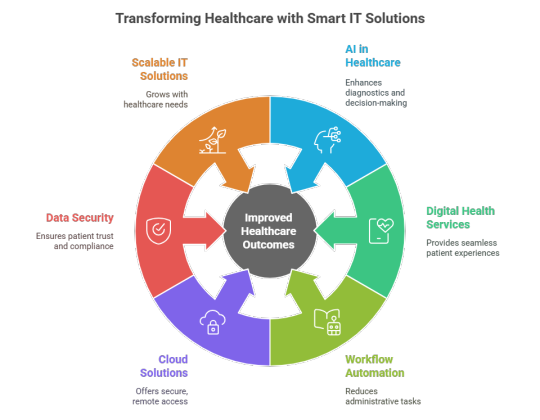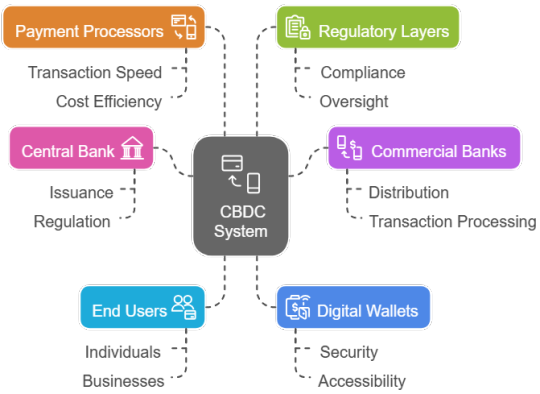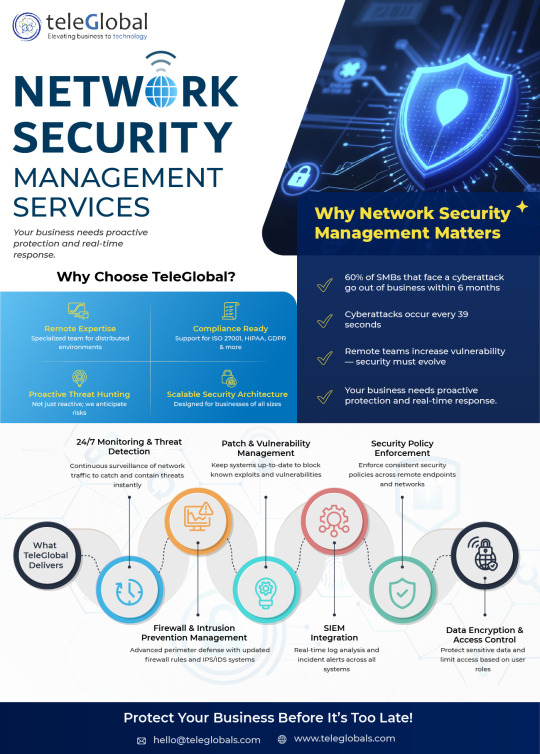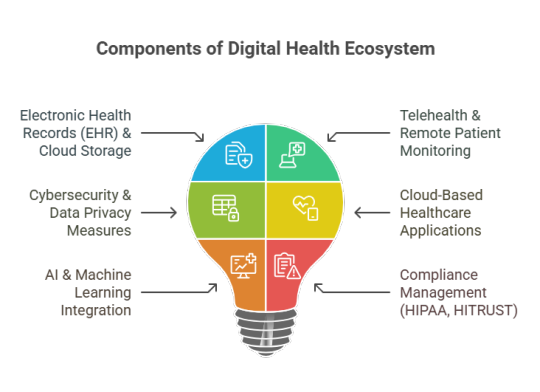#Cloud infrastructure support
Explore tagged Tumblr posts
Text
Choosing the Right Managed IT Service Provider for Healthcare

The healthcare industry increasingly depends on technology to improve patient care, streamline operations, and ensure compliance. With the growth in cybersecurity threats, there is an increased need for seamless IT infrastructure and managed IT service providers. Choosing the right managed services provider (MSP) is challenging but essential for optimizing cloud operations. Look for experienced and certified MSP Certifications. Ensure they offer comprehensive monitoring, security, data backup, and disaster recovery services. Additionally, ensure they scale with your business, provide 24/7 support, and follow industry standards for security.
Understanding Managed IT Services in Healthcare
What Are Managed IT Services for Healthcare?
Managed IT services in healthcare involve outsourcing a healthcare facility’s IT infrastructure and operations to a third party at a lower cost than running an internal department. Third-party service providers for medically managed services are also known as managed service providers.
Why Do Healthcare Organizations Need IT Service Management?
Healthcare organizations need IT-managed service providers to establish efficient access to sensitive patient data, improve operational efficiency, enhance patient safety by streamlining processes, reduce costs, and deliver better quality care by aligning IT services with the organization’s healthcare goals.
Key Benefits of Healthcare IT Managed Service Providers
Enhanced Cybersecurity and Compliance
One key benefit of utilizing a healthcare IT-managed service provider is remarkably enhancing cybersecurity and compliance to ensure that sensitive patient data is protected at all costs while adhering to strict industry regulations. It allows healthcare organizations to focus on patient care while minimizing the risk of data breaches.
Improved Efficiency and Reduced Downtime
Healthcare-managed IT service providers offer benefits like improved operational efficiency and significantly reduced downtime. It is easy to achieve by proactive monitoring, rapid issue resolution, on-point technical support, and scalable infrastructure. This helps healthcare organizations deliver excellent patient care while ensuring their IT systems run smoothly and securely without hampering patient care.
Cost Savings and Scalability
Healthcare IT managed services focus on cost savings through outsourcing IT management, making more efficient use of resources and scalability to adapt to changing healthcare needs. Healthcare organizations should be able to scale their IT infrastructure up or down as required.
How to Choose the Best Healthcare IT Managed Service Provider
Experience in Healthcare IT Service Management
While choosing the best healthcare IT-managed service provider for your facility, prioritize their experience in the healthcare industry. Verify that they understand your facility's unique IT needs and compliance regulations like HIPAA and have expertise in managing electronic health records.
Compliance with HIPAA and Other Regulations
Prioritize healthcare IT-managed service providers with a strong track record of security practices, a deep and thorough understanding of healthcare regulations, and proven expertise in data protection.
24/7 Support and Proactive Monitoring
Look for healthcare IT-managed service providers with deep healthcare industry experience, strong compliance records, robust monitoring capabilities, and a proven track record of offering 24/7 support.
Customization and Scalability of IT Solutions
When choosing a healthcare IT-managed service provider, look for their ability to offer customized and scalable IT solutions that align well with your facility’s unique needs. Evaluate their experience in the healthcare industry based on their technical expertise, compliance, and capability to adapt to changing situations.
Common Mistakes to Avoid When Selecting a Healthcare IT Service Provider
When choosing a healthcare IT-managed service provider, common mistakes to avoid include:
Focusing only on the price
Not clearly defining your needs
Ignoring their experience in the healthcare industry
Overlooking security and compliance concerns
Failing to check their reputation
Not understanding their service model
Not checking references and reputation
Not considering future needs
Future Trends in Managed IT Services for Healthcare
The healthcare IT landscape is evolving rapidly, with new technologies shaping the future of managed IT services. Trends include:
AI-driven automation for predictive maintenance and cybersecurity threat detection.
Blockchain technology for secure and transparent patient data management.
Cloud-based healthcare systems for enhanced interoperability and accessibility.
Telehealth advancements powered by 5G and edge computing

Conclusion: Ensuring the Best IT Support for Healthcare Organizations
Selecting the right healthcare IT-managed service provider is essential for healthcare organizations looking to enhance cybersecurity, compliance, and operational efficiency. The ideal MSP should offer:
Expertise in healthcare IT and experience managing cybersecurity and compliance.
24/7 monitoring and proactive IT support to minimize downtime and security risks.
Customizable and scalable IT solutions aligning with healthcare needs.
By partnering with a reputed and reliable healthcare IT-managed service provider like XLNC Technologies, healthcare organizations can focus on delivering exceptional patient care while maintaining secure and efficient IT systems.
FAQs
What are the key factors to consider when choosing a managed IT service provider for healthcare?
Healthcare organizations should evaluate industry expertise, HIPAA compliance, cybersecurity capabilities, 24/7 support, scalability, and integration with existing systems. A provider with proven experience in healthcare IT, proactive monitoring, and customized solutions ensures operational efficiency, regulatory adherence, and uninterrupted patient care.
How do healthcare IT-managed service providers help with regulatory compliance?
Managed IT service providers to ensure HIPAA and GDPR compliance by implementing secure data encryption, access controls, regular security audits, and automated risk assessments. They help healthcare organizations avoid fines, prevent data breaches, and maintain regulatory compliance through ongoing monitoring, documentation, and proactive security measures.
Why is cybersecurity crucial in managed IT services for healthcare?
Cybersecurity is essential to protect sensitive patient data from ransomware, phishing attacks, and unauthorized access. MSPs provide AI-driven threat detection, zero-trust security models, real-time monitoring, and multi-layered encryption to safeguard electronic health records (EHRs) and ensure uninterrupted healthcare operations.
What are the benefits of outsourcing IT service management in healthcare?
Outsourcing IT services reduces costs, enhances security, minimizes downtime, and improves scalability. Managed IT providers offer 24/7 support, cloud-based solutions, proactive monitoring, and compliance management, allowing healthcare organizations to focus on patient care rather than IT complexities
How can a healthcare IT-managed service provider improve patient care?
MSPs improve patient care by ensuring secure, fast access to medical records, enabling seamless telehealth solutions, reducing system downtime, and enhancing data accuracy. With real-time monitoring and AI-powered automation, providers can deliver efficient, uninterrupted, high-quality healthcare services.
#Managed IT Services for Healthcare#Healthcare IT Solutions#Healthcare Digital Transformation#IT Support for Hospitals#Cloud Solutions in Healthcare#Healthcare Data Security#HIPAA Compliance#Healthcare IT Compliance#Telehealth IT Support#Electronic Health Records#EHR Management#Cybersecurity in Healthcare#Remote Patient Monitoring#IT Infrastructure Management#24/7 IT Support for Healthcare#IT Outsourcing in Healthcare#Disaster Recovery for Hospitals#Cost-effective IT Services#Patient Data Protection#Healthcare Compliance Solutions#Healthcare Cloud Management#Managed Service Providers for Healthcare#Improving Patient Experience with IT#Healthcare IT Consulting
0 notes
Text
CBDC technology partner India

As CBDCs become a global reality, Prodevans equips banks with everything needed to enter the digital currency ecosystem. We provide full-spectrum CBDC implementation — including compliant architecture, token management, real-time reconciliation, secure wallet enablement, and 24/7 L1/L2 support. Trusted for our role in India’s national rollout, we help institutions go beyond pilots to scalable, production-ready platforms ensuring seamless end- user readiness. Our services ensure central bank compliance while delivering performance, observability, and rapid response to evolving regulatory needs. Whether you’re in the pilot phase or preparing for production rollout, Prodevans supports your CBDC journey at every step.
OUR ADDRESS
403, 4TH FLOOR, SAKET CALLIPOLIS, Rainbow Drive, Sarjapur Road, Varthurhobli East Taluk, Doddakannelli, Bengaluru Karnataka 560035
OUR CONTACTS
+91 97044 56015
#CBDC (Central Bank Digital Currency)#Cloud Computing & Cloud Services#Application Modernization#360° Monitoring (Server#Application#Database & Virtualization Monitoring)#Identity & Access Management (IAM)#Automation (incl. ML‑driven#Ansible#network/cloud automation)#DevOps Tools & Support#Infrastructure Management (IaaS/PaaS/SaaS#orchestration#orchestration tools)
0 notes
Text

Network Management Services in Pune | Teleglobal
Empower Your Network for Efficient Performance From network setup and monitoring to firewalls and load balancer setup, we offer a secure, optimized, and high-performing network infrastructure. Our Network Management Services provides end-to-end solutions that boost network security, performance, and reliability, ensuring nothing interrupts connectivity of your business.
Optimize Your Network Today https://teleglobals.com/contact-us
#Network Management Services#Network Management#IT Infrastructure#Remote Monitoring#IT Support#Managed Services#Tech solutions#Digital Transformation#Cloud Computing#Cyber Security#Business Continuity
0 notes
Text
The Amazing Cloud & Infrastructure Services in Sheffield: An overview
With the fast pace of development of the digital era, the foundation of any fast-growing, scalable business is strong cloud and IT infrastructure. Sheffield businesses, old and new, are increasingly turning to professional cloud solutions to automate business processes, enhance security, and enable remote working. With growing demand, local players are rising to the challenge to provide cloud and infrastructure solutions that meet today's business requirements. Are you someone who wants to gather more facts about the cloud & infrastructure services in Sheffield, Cloud Services in Sheffield? If Yes. This is the best place where people can gather more facts about the cloud & infrastructure services in Sheffield, Cloud Services in Sheffield.

The Cloud Services in Sheffield
Cloud services in Sheffield go way beyond mere data storage. They include a broad spectrum of services—cloud hosting, virtual servers, managed IT infrastructure, disaster recovery, and on-demand compute resources. From having to move existing installations to embracing new cloud-native applications, Sheffield providers have the technical expertise and experience required to offer seamless migrations with little or no disruption.
The greatest benefit of cloud deployment is its flexibility. Local companies can scale resources up and down as necessary, remotely access their systems, and only pay for what they utilize. Not only does this maximize the cost of IT, but enable rapid expansion without being saddled with physical infrastructure.
With it is the escalating demand for hybrid and remote and cloud offices, business as usual remains undisturbed due to cloud infrastructure. Sheffield specialists assist organizations in deploying collaboration software, virtual desktops, and remote access solutions that are secure. This enables groups to become networked, productive, and secure—remote or otherwise.
What distinguishes Sheffield's cloud and infrastructure providers is that they are dedicated to assisting along the way. Firms aren't presented with an answer and left to their own devices—instead, they are given active monitoring, diagnosis, and seasoned advice as technologies evolve. This enables digital transformation more and makes it more long-lasting.
For any business that hopes to make a difference in its operations, reduce IT spending, and stay agile, investing in Sheffield's infrastructure and cloud solutions is a shrewd business move. World-class technology combined with homegrown-developed expertise provides businesses with the solution they require to be competitive and thrive in an economy where digital dominates analogue.
#cloud & infrastructure services in Sheffield#App Development services in Sheffield#IT support in Sheffield
0 notes
Text
ZeaCloud® Public Cloud – Scalable & Secure IaaS Solutions
ZeaCloud® offers automated, pay‑as‑you‑go Infrastructure‑as‑a‑Service (IaaS) based in New Delhi. Enjoy scalable storage, networking, and compute powered by NVMe and virtualization, with 24×7 AI‑augmented support and simplified self‑service interfaces. Ideal for enterprises seeking reliable, cost‑effective cloud transformation. for more details visit: Zeacloud- Public Cloud Page
#Public Cloud#Infrastructure as a Service (IaaS)#Scalable Cloud Solutions#Pay‑as‑you‑go Cloud#NVMe Storage#Managed Cloud Services#Automated Cloud Infrastructure#24×7 Cloud Support#Virtualization#Self‑Service Cloud Dashboard#ZeaCloud#Cloud in New Delhi#Secure Cloud Hosting
0 notes
Text

The best network management services help manage an organization's network using secure firewalls and malware detection controllers. They also collect data from connected network devices such as switches, routers, access points, and client devices. These services facilitate smooth interaction between devices. Net Access India Limited provides this service at an affordable price. Please reach out to us for more information and a free demo.
#network management services#IT infrastructure management services#IT infrastructure management services in india#net access india limited#gate management software#field force management software#crop management software#IT infra solutions#network management software#managed cybersecurity services#managed datacenter services#end-user support services#endpoint security services#lease management software#board meeting software#phishing simulation services in india#vapt testing services in india#cloud managed services providers in india#mdm solutions#network transformation services
0 notes
Text

At Preemptive Technofield, we specialize in helping organizations navigate their digital journey with tailored IT infrastructure solutions. Enhance your business efficiency, agility, and measurable outcomes with our expert consulting.
#network design#it infrastructure#Enterprise System Integration#Cloud Migration#Managed Services#Cybersecurity Solutions#Data Center Solutions#Unified Communications & Collaboration#AMC & IT Support Services
1 note
·
View note
Text
Empower Your Business with Dedicated IT Resources from Quarec Resources Pvt. Ltd.

At Quarec Resources Pvt. Ltd., we provide top-tier Dedicated IT Resources to propel your business forward. Our skilled IT professionals seamlessly integrate with your team, offering expertise in software development, system administration, network management, and more. By choosing our dedicated resources, you gain flexibility, cost-efficiency, and the ability to swiftly adapt to evolving technological demands. Partner with Quarec to ensure your IT operations are robust, scalable, and aligned with your strategic goals.
#Dedicated IT Resources#IT Staff Augmentation#Dedicated IT#Software Development Team#System Administration Services#Network Management Solutions#IT Outsourcing#Remote IT Support#IT Consulting#Cloud Computing Services#Cybersecurity Solutions#Data Analytics Services#IT Project Management#Technical Support Services#IT Infrastructure Management
0 notes
Text
Comprehensive IT Infrastructure Solutions | Vivency Technology LLC
Vivency Technology LLC offers expert IT infrastructure solutions to help businesses build, manage, and optimize their IT environments. Our services include network solutions, data center solutions, cybersecurity, IT consulting, and managed services. Partner with us for reliable and scalable IT infrastructure tailored to your needs.

https://www.vivencyglobal.com/infrastructure-solutions/
#IT infrastructure solutions#IT infrastructure services#network solutions#data center solutions#cybersecurity solutions#IT consulting#managed IT services#business IT solutions#IT infrastructure company#IT support services#enterprise IT solutions#cloud infrastructure#IT security solutions#IT infrastructure provider#technology infrastructure#IT networking solutions#infrastructure management#IT optimization#IT infrastructure Dubai#Vivency Technology LLC.
0 notes
Text
A Strategic Approach to Cloud Migration: How Web Synergies Ensures a Seamless Transition
In today’s fast-paced digital landscape, businesses are increasingly recognising the need for a well-planned cloud migration strategy. Moving operations to the cloud isn’t just about upgrading technology—it’s a critical step towards improving efficiency, scalability, and resilience. However, without expert guidance, this transition can present unforeseen challenges. At Web Synergies, we’ve fine-tuned our approach to ensure that cloud migration is a smooth, secure, and beneficial process for businesses of all sizes.
Why Cloud Migration Matters
As industries embrace digital transformation, cloud adoption has become essential for organisations to remain competitive. A successful cloud migration enables:
Increased Operational Efficiency: Cloud solutions allow businesses to streamline operations, reduce downtime, and eliminate costly on-premises hardware.
Enhanced Data Security: Today’s cloud platforms come with advanced security measures to protect sensitive data and ensure compliance with industry standards.
Scalability and Flexibility: With cloud infrastructure, businesses can effortlessly scale resources to meet changing demands and support growth.
However, the journey to the cloud requires careful planning and a tailored approach. That’s where Web Synergies stands out.
Web Synergies’ Proven Cloud Migration Strategy
Our team at Web Synergies understands that every business has unique requirements and goals. By focusing on a strategy-driven migration process, we ensure that each step aligns with your specific business objectives. Here’s how we do it:
Assessment and Planning The foundation of a successful migration is a thorough assessment. We begin by evaluating your existing infrastructure, identifying critical applications, and pinpointing potential challenges. Our team creates a migration roadmap that prioritises business continuity and minimises disruption.
Customised Migration Pathway Whether you’re moving to a public, private, or hybrid cloud, Web Synergies tailors the migration pathway to best suit your organisational needs. Our customised approach ensures that your business enjoys the full benefits of the cloud without unnecessary complications.
Data Security and Compliance In today’s digital age, data security is paramount. Web Synergies employs the latest security protocols, ensuring your data remains safe throughout the migration. Our compliance-focused solutions meet industry standards, offering peace of mind that your information is protected.
Optimising and Testing A seamless transition means thorough testing. Before the full migration, we conduct rigorous testing to identify and resolve any issues. This ensures a stable and optimised cloud environment tailored to your specific needs.
Post-Migration Support Our commitment doesn’t end once the migration is complete. We provide ongoing support to help you navigate your new cloud environment, optimise costs, and leverage advanced cloud features for enhanced productivity.
Benefits of Choosing Web Synergies for Cloud Migration
Partnering with Web Synergies means more than just moving to the cloud. It’s about setting your business up for success in a digital-first world. Here’s what sets us apart:
Proven Expertise: Our seasoned team has a wealth of experience across various industries, ensuring a smooth migration that fits your needs.
Future-Ready Solutions: We design scalable cloud solutions that not only support your current requirements but are flexible enough to adapt to future demands.
Enhanced Agility: With our cloud migration services, your business gains the agility to respond quickly to market changes, fostering innovation and growth.
Embrace the Cloud with Confidence
Migrating to the cloud is a significant step in your business’s digital journey. With Web Synergies’ strategic approach, you can make this transition confidently, knowing you have a partner committed to your success. From assessment and planning to post-migration support, we’re here to ensure that your journey to the cloud is seamless and secure.
Ready to take your business to new heights with cloud migration? Partner with Web Synergies today to experience a smooth, strategic, and secure move to the cloud.
#Cloud migration strategy#Seamless cloud migration#Cloud solutions for businesses#Data security in cloud migration#Post-migration support#Web Synergies cloud services#Cloud infrastructure optimisation#Business continuity in cloud migration#Future-ready cloud solutions#Secure cloud transition
0 notes
Text
Why Healthcare Providers Need Managed IT Services for Better Patient Care

The healthcare industry is going through a massive digital transformation, with electronic health records, telehealth, cloud-based patient management, and data security becoming the foundation of modern care. A hospital or healthcare center has many things to juggle at once: Accessing a patient’s medical history, checking real-time lab results, and managing endless billing cycles. Managing all this can lead to chaos, operational failure, and bad patient experience. That’s where Managed IT Services comes in.
Studies show that around 84% of hospitals and healthcare centers use cloud services for backup, analytics, and disaster recovery. The integration of IT into healthcare has restructured the industry, from healthcare technology like electronic health records and electronic medical records systems to practice management and telemedicine platforms.
Understanding Managed IT Services in Healthcare
What Are Managed IT Services for Healthcare?
Managed IT services for medical practices and healthcare centers mean outsourcing a facility’s IT functions and operations to a third party at a lower cost than running an internal IT department. The services provided by a third party for managed medical services are known as managed service providers (MSPs).
Common managed IT services for healthcare include:
Cybersecurity and Compliance: Advanced security protocols, including endpoint protection, threat detection, and compliance.
Cloud and Data Management: This service helps secure cloud storage for managing electronic health records, medical imaging, and real-time data access.
24/7 Monitoring and Support: Continuous monitoring of IT infrastructure to detect and resolve issues before they impact healthcare operations. This ensures that healthcare IT systems are always up and running.
Network and Infrastructure Management: Optimizes connectivity for seamless communication
Disaster Recovery and Business Continuity: This includes backup and recovery strategies to safeguard critical patient and operational data in case of system failure.
How Do Healthcare-Managed IT Services Work?
Here’s how IT-managed services work:
Monitoring
Managed IT services to monitor systems, networks, and applications to assess their performance, security, and compliance. For example, they can manage and monitor medical applications and do the necessary upgrades daily.
Maintenance
Managed IT services for healthcare assistance in performing routine maintenance tasks such as software updates, network supervision, and disaster recovery.
Security
Healthcare-managed IT services have 24/7 support for employees, patients, and clinics to improve operational efficiency.
Issue Resolution
They resolve issues in real time through help desks. These help desks can include a general IT help desk, a clinical service help desk, and a patient service help desk. Both employees and patients can use these help desks to resolve their issues in real time.
Challenges in Healthcare IT Management
Cyber Attacks
Cybersecurity is the top challenge for healthcare leaders. Attackers are getting smarter and more strategic; thus, we need stricter norms against cyber attacks.
The healthcare industry is more vulnerable to these types of threats:
Ransomware
Data Breaches
DDoS Attacks
Insider Threats
Healthcare IT Security Risks
One of the biggest risks in healthcare systems is the insecure storage and transmission of sensitive patient data. Weak encryption, poor access control, and bad data handling can allow unauthorized individuals to access patient information, which cybercriminals can use to access valuable data.
The Growing Need for Compliance and Data Protection
Compliance is a big challenge for healthcare providers. Laws like HIPAA require strict measures to protect sensitive patient information, and non-compliance can lead to large fines and legal issues.
Managed IT service for healthcare providers to help healthcare organizations comply by:
Encrypting data and secure access
Conducting regular compliance audits and security assessments
Having data backup and disaster recovery plans in place.
Key Benefits of IT Managed Services in Healthcare
Data Security and HIPAA Compliance
One of the benefits of managed IT services in healthcare is the significant boost in data security and guaranteed HIPAA compliance to protect sensitive patient data/information with continuous monitoring, proactive threat mitigation, and expert guidance in navigating complex healthcare regulations, minimizing data breaches and legal penalties.
Operational Efficiency for Healthcare Providers
IT-managed services in healthcare have proven to improve operational efficiency by streamlining processes, minimizing downtime, and securing sensitive patient data/information to comply with regulations. This will allow healthcare providers to focus on patient care rather than managing IT infrastructure and having access to expert technical support to address issues promptly.
24/7 IT Support and Zero Downtime
IT-managed services in healthcare can provide 24/7 IT support and zero downtime through proactive monitoring and rapid problem-solving. This approach offers remote monitoring and management, disaster recovery solutions, and rapid troubleshooting. This also gives access to on-demand expertise for temporary projects or scenarios where skill sets are not internally employable.
Cost Savings with Healthcare IT Managed Services
Managed IT services can reduce costs by eliminating hardware acquisition and labor costs.
How Managed IT Services Improve Patient Care
Faster Access to Patient Records with Cloud Solutions
Managed IT services can improve patient care by giving faster access to patient records through cloud solutions so healthcare providers can make informed decisions quickly, which will lead to better diagnosis, treatment plans, and overall patient experience while maintaining data security and accessibility anywhere.
Better Telehealth and Remote Patient Monitoring
Managed IT services provide better telehealth and remote patient monitoring. These services allow healthcare providers to deliver continuous patient care through digital platforms. Early interventions, better chronic condition management, and patient engagement simplifications reduce costs.
No Downtime for Uninterrupted Patient Care
Managed IT services mean minimal downtime, and healthcare professionals can focus solely on delivering excellent medical care to patients without technology interruptions.
Choosing the Right Managed IT Services Provider for Healthcare
Key Factors to Consider in Healthcare IT Managed Services
When looking for a managed IT service provider:
Proven experience in the healthcare industry
Proven expertise and compliance with HIPAA and HITRUST
Strong security measures for patient data
Scalability to meet changing needs
Service level agreements (SLAs)
How to Evaluate Managed IT Services for Healthcare Providers
When evaluating managed IT service providers for healthcare:
Do they understand healthcare regulations like HIPAA?
Expertise in relevant technology like EHR
Scalability
Strong cybersecurity practices
Proven track record in healthcare
Clear communication on service-level support
Request case studies and client testimonials
Future of Managed IT Services in Healthcare
As technology advances, managed IT services will use:
AI-driven automation for predictive maintenance
Blockchain for patient data management
Interoperability between healthcare systems
Advanced cybersecurity frameworks for protection against cyber attacks

Conclusion: Why Healthcare Providers Must Invest in Managed IT Services
Healthcare providers must invest in IT-managed services to focus on patient care. By outsourcing complex IT infrastructure management, providers can have a robust cybersecurity framework to protect patient data, perform proactive system monitoring for operational efficiency, deliver high-quality care, and comply with industry regulations.
By partnering with a managed IT service provider, healthcare organizations can focus on what matters most—patient care.
With over 20 years of IT consulting and managed services experience, XLNC Technologies helps healthcare providers navigate a digital transformation without compromising security, efficiency, or compliance.
By choosing XLNC Technologies, healthcare organizations have a trusted partner to deliver future-ready IT solutions for seamless, secure, and patient-centric healthcare.
FAQs
What are managed IT services in healthcare, and how do they work?
Managed IT services in healthcare mean outsourcing IT management to specialist providers who ensure security, compliance, and efficiency. They offer 24/7 monitoring, cybersecurity, cloud solutions, and data backup so you can focus on patient care.
How do managed IT services help healthcare providers improve patient care?
They help with patient care by giving fast access to medical records, secure telehealth solutions, and minimal downtime. AI-driven monitoring and cloud-based data storage mean AI-driven seamless care, better diagnoses, and better patient outcomes through secure and efficient technology.
What are the benefits of IT-managed services in healthcare security?
Managed IT services deliver security with AI-driven threat detection, data encryption, zero-trust architecture, and real-time monitoring. They protect electronic health records (EHRs) from cyber threats, ransomware, and data breaches, so you’re HIPAA compliant, and patient data is private.
How can managed IT services help healthcare organizations stay compliant with regulations?
They help with HIPAA and regulatory compliance by implementing strong security protocols, encrypted data storage, and access control. Regular audits, automated risk assessments, and secure backups reduce legal risk and protect patient data from breaches and unauthorized access.
How do healthcare providers choose the right managed IT services provider?
They should evaluate IT vendors based on their industry expertise, 24/7 support, cybersecurity capabilities, compliance readiness, and scalability. Check past performances, case studies, and security frameworks. A provider with proactive monitoring and custom solutions will maintain efficiency, compliance, and better patient care.
#Managed IT Services for Healthcare#Healthcare IT Solutions#Healthcare Digital Transformation#IT Support for Hospitals#Cloud Solutions in Healthcare#Healthcare Data Security#HIPAA Compliance#Healthcare IT Compliance#Telehealth IT Support#Electronic Health Records#EHR Management#Cybersecurity in Healthcare#Remote Patient Monitoring#IT Infrastructure Management#24/7 IT Support for Healthcare#IT Outsourcing in Healthcare#Disaster Recovery for Hospitals#Cost-effective IT Services#Patient Data Protection#Healthcare Compliance Solutions#Healthcare Cloud Management#Managed Service Providers for Healthcare
0 notes
Text

🔥Want to access 𝗧𝗮𝗹𝗹𝘆 on cloud Anytime & Anywhere? Hurry up and connect with us🔥
.
Quickest Setup, go live in 15 minutes
Zero Maintenance Cost
🔴Why choose us
Own Data Center infrastructure
23 years of experience
10000+ Happy Clients Pan India
High Data Security
24/7 Support
.
☎️ +91-8800198868
visit now : https://kisitservices.in
#tallyoncloud #cloudcomputing #cloud #tally #AWS #krishna #cloudservices #tallycloud #busy #margoncloud #busyoncloud #dataprotection #privacy #security #krishnacloudservices #krishnacloud #kisitservices #kisit
#🔥Want to access 𝗧𝗮𝗹𝗹𝘆 on cloud Anytime & Anywhere? Hurry up and connect with us🔥#.#Quickest Setup#go live in 15 minutes#Zero Maintenance Cost#🔴Why choose us#Own Data Center infrastructure#23 years of experience#10000+ Happy Clients Pan India#High Data Security#24/7 Support#☎️ +91-8800198868#visit now : https://kisitservices.in/#tallyoncloud#cloudcomputing#cloud#tally#AWS#krishna#cloudservices#tallycloud#busy#margoncloud#busyoncloud#dataprotection#privacy#security#krishnacloudservices#krishnacloud#kisitservices
0 notes
Text
Accelerating Business Growth: Unleashing Scalability with Technical Expertise

Accelerating Business Growth: Unleashing Scalability with Technical Expertise- Read Blog- https://centurygroup.net/accelerating-business-growth-unleashing-scalability-with-technical-expertise/
#itinfrastructure #itsolutions #networkinfrastructure #itequipment #informationtechnology #cloudcomputing #cloudinfrastructure #cloudserver #datacenterinfrastructure #datacenter #networksecurity #networkequipment #builddatacenters #cloudstorage #itsecurity #itservices #itengineer
#it infrastructure#business growth#business it support#Network Infrastructure#IT Equipment#managed it services#managed it solutions#cloud technology services#custom it solutions
1 note
·
View note
Text
Everything About the Best Cloud Infrastructure Solutions in Sheffield
With increasing businesses applying digital transformation, cloud infrastructure now forms a corner stone that is necessary for development, sustainability, and business operational efficiency. For businesses in Sheffield, cloud-based solutions are becoming attractive not because it is simply convenient but in order to accrue long-term strategic advantage. Sheffield cloud service is assisting all types of businesses in modernizing their IT practices, saving them money, and making them agile.
The Cloud Services in Sheffield
The transition to cloud infrastructure is a chance to break away from inflexible, hardware-bound systems and move to elastic and flexible environments. That is, businesses no longer need to shell out huge amounts of money on on-prem servers or risk hardware failure and ongoing support. They can hire computer power, storage, and software as needed—and only pay for what they use instead. This keeps expenses low not only but also allows companies to expand extremely quickly as their needs shift. Are you someone who wants to gather more facts about the Cloud Infrastructure Solutions in Sheffield, Cloud Services in Sheffield? If Yes. This is the best place where people can gather more facts about the Cloud Infrastructure Solutions in Sheffield, Cloud Services in Sheffield.
Sheffield cloud hosts are in the key position of effortless and effective migration. They provide end-to-end service—from consultation and system design to migration and post-deployment management. If an organisation is starting from scratch with cloud or would like to optimize its current setup, local providers provide a tailored, strategic solution which promises technical reliability as well as business fit.

One of the most significant advantages of Cloud Infrastructure Solutions in Sheffield is its potential to enhance business continuity. With data backup, secure remote access, and disaster recovery functionality built into it, businesses can carry on even in the case of an unexpected outage. It is especially crucial in the current fast-moving and dynamic business climate, where any downtime means expensive losses.
Yet another core benefit is security. Suppliers based in Sheffield use advanced controls like encryption, access controls, and real-time monitoring to ensure sensitive information remains secure. The services enable businesses to remain compliant with industry standards without losing the trust of clients and stakeholders.
For competitive, scalable, and secure business, cloud infrastructure is no longer a luxury but a necessity. Sheffield has the experienced experts and strong services to enable businesses to unlock the full potential of the cloud. From increased efficiency and security to resilience and innovation, cloud solutions are leading the way to a brighter future for Sheffield's business community.
0 notes
Text
Discover Vast Edge’s managed cloud services, offering end-to-end support and optimization for your cloud infrastructure. Focus on your core business while we handle the technical details.
0 notes
Text
#Accounting Software In Dubai#Best Accounting Software In UAE#IT Infrastructure Services In Dubai#IT Services In Dubai#Managed IT Service Providers In Dubai#IT Support Companies In Dubai#IT Networking Solutions Company Dubai#Access Control System Suppliers In Dubai#Firewall Installation Services In Dubai#Accounting Software For Small Business In Dubai#Best Accounting Software Solutions In Dubai#Best Accounting Software For Medium Business In Dubai#Cheap Accounting Software For Small Business In Dubai#Best Cloud Based Accounting Software In Dubai#Best Low Cost Accounting Software For Small Business In Dubai#Best Accounting Software For Small To Medium Business In Dubai#Best Business Accounting Software Services In Dubai#Best Software Company In Dubai#Web Designing Services In Dubai#Best SEO Services In Dubai#Top HRMS Software In Abu Dhabi#Best ERP Solution Provider UAE#Best Project Management Software In Dubai#Fitness and Gym Management Software In Dubai#MEP Contracting ERP Software In Dubai#Best ERP Software For Metal Fabrication Industry In Dubai
0 notes